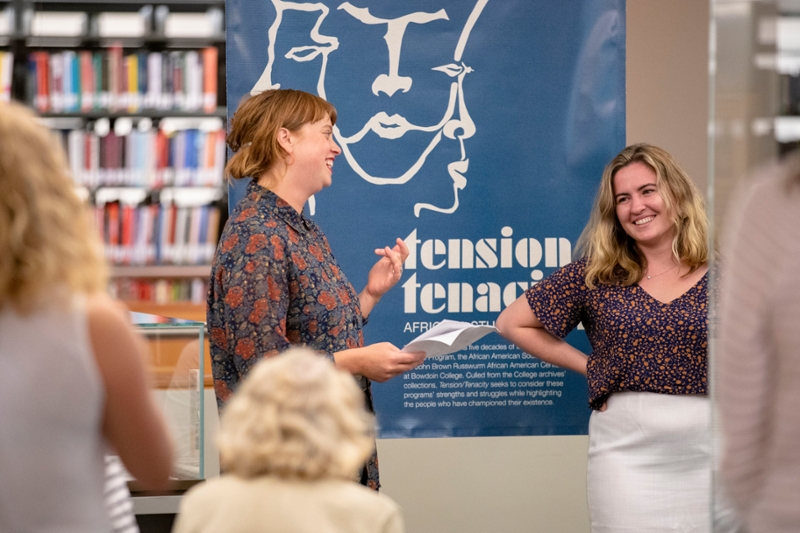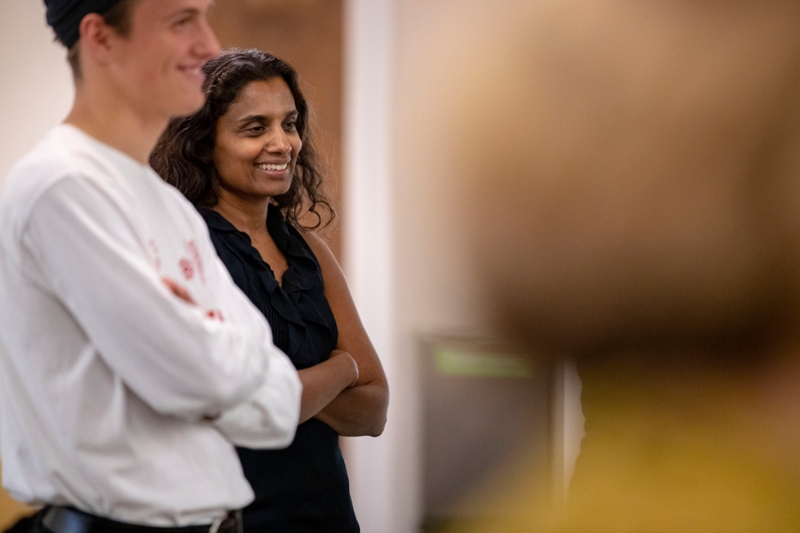Five Decades of Change
By Tom PorterThis year is an important milestone in Bowdoin’s history. It marks five decades of the Africana Studies program, the African American Society—now renamed the Black Student Union—and the John Brown Russwurm Center at Bowdoin College.

The occasion is being honored with a dedicated student-curated exhibition. Tension/Tenacity: Africana Studies at 50 is on the second-floor gallery of the Hawthorne-Longfellow Library for the rest of the semester. Culled from the College Archives’ collections, Tension/Tenacity seeks to consider the programs’ strengths and struggles while highlighting the people who have championed their existence.
Lucy Ryan ’19 pored through a mountain of material in putting together the show, she explained at a recent presentation to mark the event’s launch. The exhibition is divided into five thematic display cases, each containing a mixture of documents, from posters and flyers, to photographs, to letters, and College newspaper articles.
“There’s the inception case, which depicts the foundations of the CAAS [Committee on Afro-American Studies], the proposal in 1969 for an Afro-American Studies (as it was then known) major, and the founding of the African American Center and the African American Society, which last year was renamed the Black Student Union.” The second case looks at the impact of student activism, while a third focuses on the leadership of the various program directors over the years, said Ryan. “There’s also a case dealing with the cultural life of the College, featuring some of the major black intellectuals and artists who have spoken here thanks to the Russwurm lecture fund.” Flyers on display advertise past talks by visiting luminaries such as acclaimed author and civil rights activist Maya Angelou and South African poet and activist Dennis Brutus, both of whom visited campus in the 1980s. The fifth display case, said Ryan, takes a step back and looks at Africana Studies in a larger historical context.
Photography by Andrew Estey.



In a question-and-answer session with Special Collections Education and Outreach Librarian Marieke Van Der Steenhoven, Ryan talked about why the show was titled Tension/Tenacity. “After it was founded, the program struggled for many years in recruiting black students and black faculty to work and stay here. The title refers to the tension produced by this fight for more recognition and funding from the College, and the tenacity of the students and faculty in continuing to advocate for the program.” For years, she explained, the program struggled. “In the early 1990s, for example, the dearth of African American faculty was declared an emergency by an external review panel.”
The tenacity eventually paid off, however, and in 2008 more full-time faculty appointments were established in Africana Studies, said Ryan. Today there are four professors and one postdoctoral fellow associated with the program. “To a large extent, it was the patient and unwavering work done by the Committee on Afro-American Studies, which included students and faculty, that kept the program afloat during its most vulnerable and uncertain years.”
Another question raised by the project, said Ryan, is what went on in the 175 years of College history before 1969, when only a handful of pioneering black students attended Bowdoin. “Although,” she admitted, “this is really a subject for a different exhibition.”





Tension/Tenacity: Africana Studies at 50 is open to the Bowdoin community and general public during Library hours. It runs through December 21, 2019. Click here for more information on Bowdoin's ongoing AF/AM/50 celebrations.